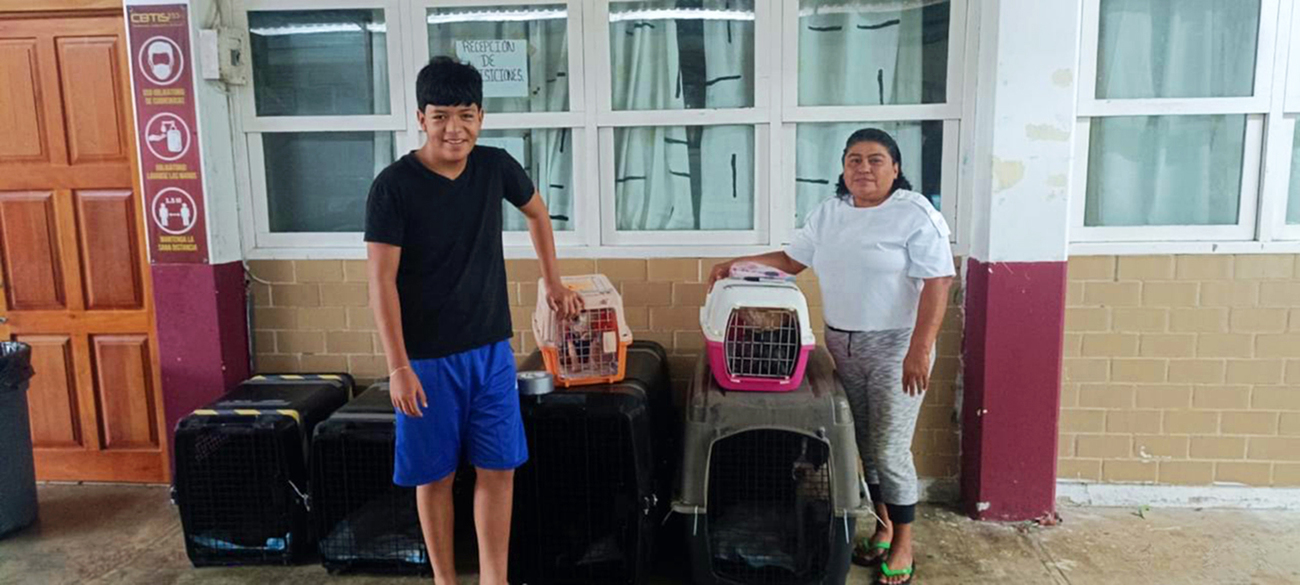Dr. Erika Flores
Project Manager & Veterinary Advisor - Latin America & Caribbean
Disaster kits keep families together when a hurricane strikes
Hurricane Beryl recently struck the Caribbean and then hit the Yucatan Peninsula, including the Mexican state of Quintana Roo. Not only are these storms devastating for communities, but they have lasting impacts on animals, too—which is why it’s so important to include animals in disaster preparedness plans.

Since 2012, IFAW has worked with partners in Quintana Roo to address the lack of animal welfare services. Several years ago, we identified an opportunity to include animals in disaster response planning and preparedness. At the time, animals were not included in temporary sheltering activities because the authorities weren’t sure how to manage animals indoors.
Hurricane shelter kits can help anyone provide temporary shelter to animals in need, so families don’t get separated. These can be used in co-habitated (animals and people together), co-located (animals separate from, but cared for by their owner), and animal-only temporary shelters. The kits are also invaluable in an emergency evacuation if a secondary disaster hits the community.
These kits include important animal identifying supplies like collars, leashes, and shelter intake and daily care paperwork, in addition to the daily necessities—dry and wet food, litter boxes, litter, and flea and tick medication. To save water from dishwashing because water can become scarce during these disasters, paper plates are included in place of the animals’ usual feeding bowls.
The kits also include pop-up crates and robust first aid kits, which can if needed decontaminate animals, treat wounds, and immobilise injured arms or legs. The first aid kits also contain tweezers to remove ticks or small foreign objects, containers for parasites or medical samples, and tarps to divide areas or cover the sides of cages to decrease an animal’s stress.
Cleanliness is important in these temporary shelters, so a robust, animal-friendly cleaning kit is also included. This contains domestic pet cleaners, enzymatic urine destroyer, dish soap, hand soap, heavy duty paper towels, gloves, brushes, and trash bags. During the COVID-19 pandemic, we added personal protection equipment (PPE) like masks to the kits, in addition to the already present goggles, lamps, and batteries. We also include knee protectors—you’d know how necessary this is after cleaning 10 animal crates in a row.
In 2023, we upgraded the kits and included a written manual on practical management and planning considerations of temporary emergency animal shelters. IFAW conducted a practical workshop with authorities, using tools such as role playing to instill the skills necessary to implement the model.
The kits were first used this year when Tropical Storm Alberto brought severe flooding to Chetumal, Quintana Roo’s capital, in June. The IBANQROO authorities stepped in to help a woman with her beloved dogs, who was welcome to stay at the temporary shelter because the shelter kit provided the proper carriers for her animals.
In some instances, it is better to ask family members and friends for temporary shelter and take your animals so the most vulnerable people can access the limited space in animal friendly temporary shelters. But this is not always possible for some families and individuals.
When Hurricane Beryl started to approach, we were able to provide training and the kits to the municipal authorities just in time. They were already doing such great work to prepare for the oncoming storm.
At the time, IFAW had been working in a community engagement project in the Tulum municipality at Punta Allen, where the hurricane hit directly. Ahead of the storm, we placed signs in the community reminding families what to pack in their bags and how to safely transport their animals to the animal friendly temporary shelters.
We saw two dogs from that community in a cohabitated shelter in Tulum, and we were happy to see both humans and animals safe from the hurricane. We were able to establish communication a week later with families in Punta Allen who withstood Beryl at home, and fortunately they were safe.
My team and I got back in time for each of us to shelter in place at our own homes. Beryl weakened—there was damage, but it was minor compared to what it could have been. Finally, the high-level authorities of Animal Welfare, Health, and Civil Protection at the State and Federal level and IFAW are working together so this temporary animal sheltering model can be offered in every municipality. Quintana Roo would become the first state in Mexico to include animals in their emergency plans in all municipalities.
Working step by step towards resilience involves much more than just providing one hurricane shelter kit, but we are getting there. These kits can be used for more than just hurricanes—they are useful in any event where people need to evacuate and safely travel with or relocate their animals.
Dr. Erika Flores
Project Manager & Veterinary Advisor - Latin America & Caribbean
Every problem has a solution, every solution needs support.
The problems we face are urgent, complicated, and resistant to change. Real solutions demand creativity, hard work and involvement from people like you.
Unfortunately, the browser you use is outdated and does not allow you to display the site correctly. Please install any of the modern browsers, for example:
Google Chrome Firefox Safari